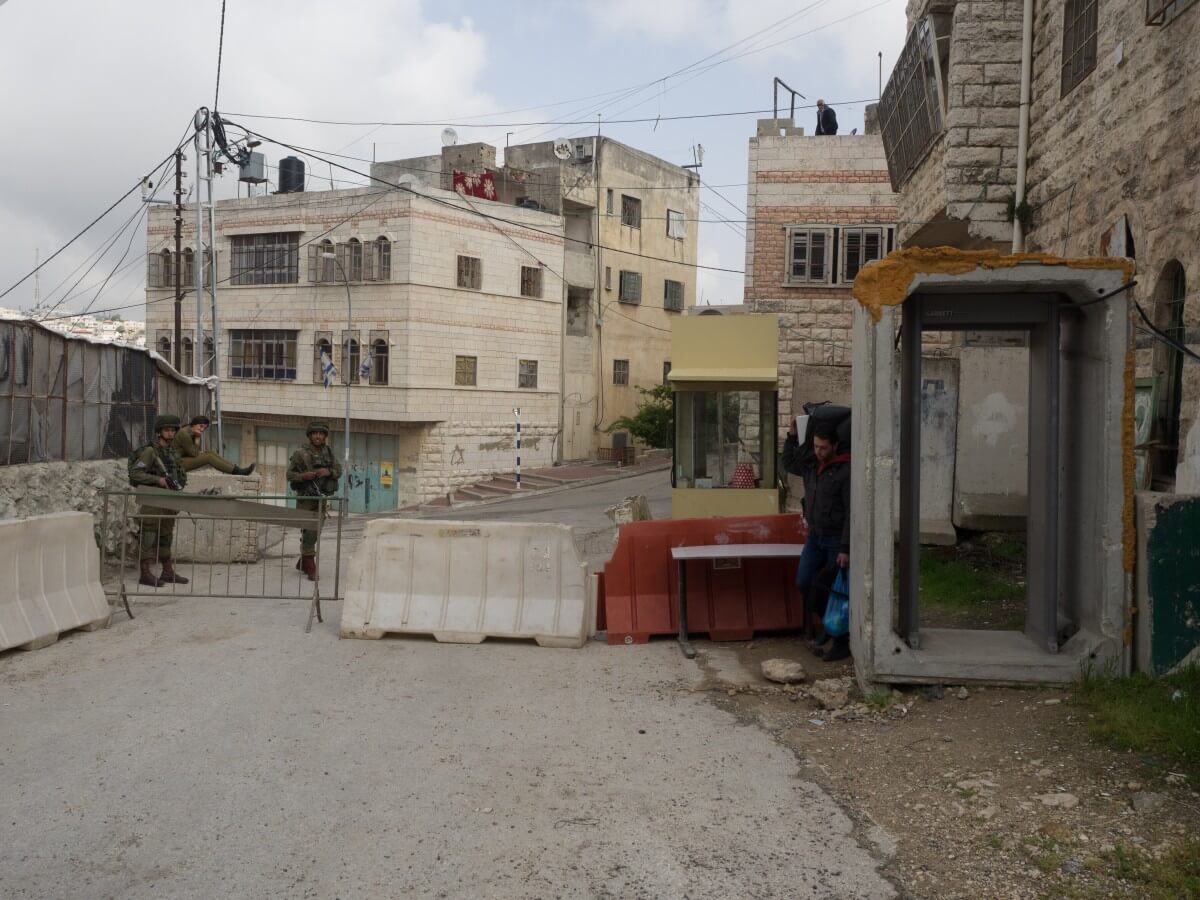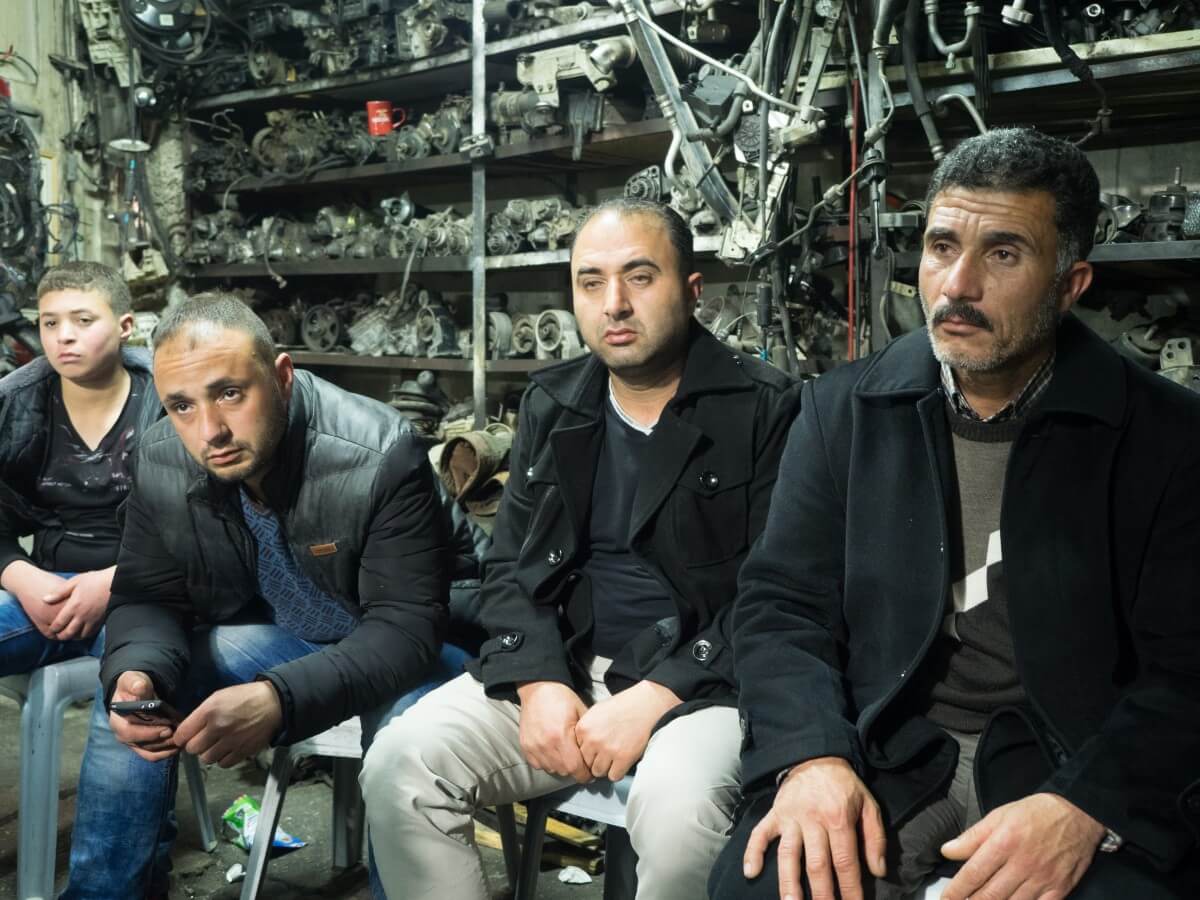The blood stain where Ramzi Aziz al-Qasrawi was shot dead remains on the ground. The spot where Abed al-Fattah Yusri al-Sharif was executed is no longer visible.
“We washed it off,” a young soldier standing at the checkpoint a few meters away tells me.
Two of the the soldiers at the checkpoint were in full combat uniform, while a third was sitting on a concrete block in a form-fitting outfit. She was from the IDF spokesperson unit, apparently stationed to control the narrative and prevent journalists from speaking to combat soldiers. When I first approached the checkpoint, the heavily-armed Bedouin soldier who demanded identification deferred to her when I asked him if he spoke English.
She was more than willing to speak on subjects other soldiers typically would not. They usually say they are barred from doing so.
She told me Hadeel al-Hashlamoun and the other young women who had been killed at checkpoints did it because their boyfriends had broken up with them.
“I saw it on her Facebook page,” she assures me, then telling me about another girl who attempted to stab a soldier after her boyfriend dumped her by text message. “Most of them are like this.”
Incensed by her comments, my colleague and Hebron local Sohaib Zahda had joined the conversation. “I was born here and have lived here my whole life. People are carrying out stabbings. Why? Ask yourself why!” he says rhetorically.
She interrupts him, “Because of the radio stations. From 2003 or 2002, we’re in different times. Fifteen years have almost passed, you can not compare then to now.”
“Life is impossible here! You know life is impossible here,” he says to her, becoming exasperated.
“Life isn’t easy,” she says.

Tel Rumeida, one of Hebron’s neighborhoods being most aggressively colonized, was declared a closed military zone on November 1. Just below is the infamous Shuhada Street, the once-bustling thoroughfare of Hebron’s old city, now a ghost town after the army shut it down and sealed the shops following the 1994 massacre in the Ibrahimi mosque by American-Israeli settler Baruch Goldstein.
Back at the scene of the execution, Youth Against Settlements activist Issa Amro was showing another team of journalists where the execution took place.
An American settler and Chabadnik named Mordechai walks by and confers with the soldiers. As he begins to walk away, I ask him if he speaks English.
“Yes,” he replies in an American accent.
“Where are you from?” I ask him.
“Here.”
“Are you American?”
“I was born there,” he tells me. “I came home!”
Mordechai is from the Crown Heights neighborhood of Brooklyn, where the Chabad Lubavitch movement is based. He is one of a few hundred settlers living in Hebron’s old city guarded by thousands of soldiers.
I ask him what he thinks about the killing. He tells me about terror attacks. “I can understand why the soldier did it,” he adds.
Minutes later, a settler driving a bus full of children stops. The driver opens the door and shouts at Issa Amro. “I saw it,” the settler laughs as kids stare out the windows. “His head went like this!” he says putting his hands behind his head and making an exploding motion.
Minutes later, children who were in the bus walk by. I estimate them to be eight years old.
“My father will kill you,” one of them shouts across the street at Amro.

Just several hundred meters away, al-Qasrawi’s father and uncles gathered in a family-owned mechanic garage.
Aziz al-Qasrawi’s grief over his son’s death made him distraught and skeptical of journalists.
“When was the website you work for founded,” he asked me.
“2006.”
“That was ten years ago. I haven’t seen any change since then,” he replies.
He’s right. It’s an internal struggle I go through from time to time.
“I would never say that my work will change anything or bring justice,” I tell him. “But I think that in order to make change, the first thing is that people have to know what is happening. So that’s my job.”
“How long will that take to achieve” he asks.
“Such a violent reality can’t last forever,” I tell him.
The grieving father remains skeptical, but indulges me.
“Ramzi liked to play with children and would take them to buy chocolates” al-Qasrawi said. “He was ambitious and loved to joke. He was engaged and worked a lot for his dream to get married.”
“He was a good man,” his fiancée’s father interjected. “He was well-educated and treated me with respect.”
Al-Sharif employed al-Qasrawi in his carpentry business. Neither were politicized or belonged to any political factions, according to Aziz al-Qasrawi.
The father doesn’t believe that the two friends and colleagues carried out an attack.
“They planned to go to Eizariya [Palestinian neighborhood in occupied East Jerusalem] that day,” he said.
“I was working and someone told me there were two guys killed in Tel Rumeida. “My brother called me and told me that my wife saw the pictures on Facebook and realized it was our son.”
“I saw the pictures but didn’t know if it was my son or not because his face was covered. I tried to call Abdel Fattah. The phone rang but there was no answer. Then I tried to call my son but his phone was disconnected.”
I thank Aziz al-Qasrawi for his time, give condolences and get up to leave. Still stoic, he thanks me.
“Would you like to eat with us?”
Editor’s note: An earlier version incorrectly identified both Bisam Abu Aisha and his wife as witnesses. Only Abu Aisha’s wife witnessed the incident.



“How long will that take to achieve” he asks.”
““Would you like to eat with us?” ”
if that doesn’t put some iron into Anti-Zionist Jewish spines nothing will.
“Aziz al-Qasrawi’s grief over his son’s death made him distraught and skeptical of journalists.”
that should have been edited out, its preposterous.
great reporting dan.
me too.
… ““I was working and someone told me there were two guys killed in Tel Rumeida. “My brother called me and told me that my wife saw the pictures on Facebook and realized it was our son.”
“I saw the pictures but didn’t know if it was my son or not because his face was covered. I tried to call Abdel Fattah. The phone rang but there was no answer. Then I tried to call my son but his phone was disconnected.”
I thank Aziz al-Qasrawi for his time, give condolences and get up to leave. Still stoic, he thanks me.
“Would you to eat with us?””
– See more at: https://mondoweiss.mystagingwebsite.com/2016/03/israeli-army-stations-dedicated-pr-officer-at-site-of-hebron-execution/#comment-164453
Dan Cohen, you have had, and do have, my everlasting respect. Aziz al-Qasrawi IS Sumud. God only knows how Palestinians manage day in and day out to keep their spirit alive while being tortured by Israel and the West, East, North and South……
I believe that it’s because all of their rights are inherent and their cause is entirely just. Who in the world would be so kind and gentle and generous in the face of such deliberate violence, theft and Occupation???
RIP. May the Israeli murderers be punished, once and for all of the murdered and massacred. There will be no ‘peace’ without justice.
“Two of the the soldiers at the checkpoint were in full combat uniform, while a third was sitting on a concrete block in a form-fitting outfit.”
‘Nuff said.
“I ask him what he thinks about the killing. He tells me about terror attacks. “I can understand why the soldier did it,” he adds.”
He “understands” why a soldier executes a Palestinian who has been allready wounded. I wonder what other war crimes he can “understand”, as long as they are commited against Nonjews.
This is state sponsored terrorism with genocidal intent. The Israeli goverment, its war criminals and supporters of war crimes have to be hold accountable.
The US support of these politics clearly proofs that it is not ready to hold itself accountable for its own crimes against natives but hides behind Israel and uses its propaganda to whitewash them.
Compare this to Germany in which people tend to support the Palestinians the more they know about this conflict:
“The more Germans know about the Mideast, the more they root for the Palestinians
A new study finds that most Germans who oppose Israel’s Palestinian policies are not anti-Semitic, but pro-peace and human rights.”
http://www.haaretz.com/misc/article-print-page/the-more-germans-know-about-the-mideast-the-more-they-root-for-the-palestinians.premium-1.443938